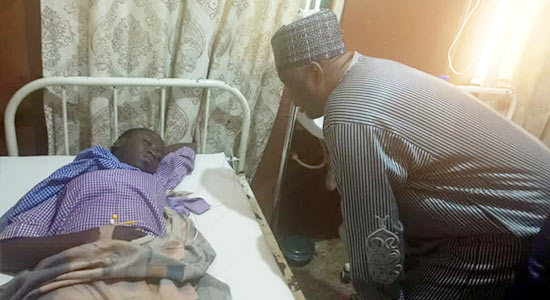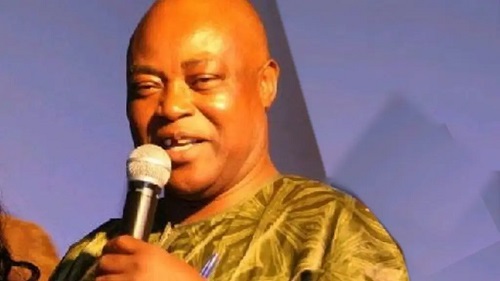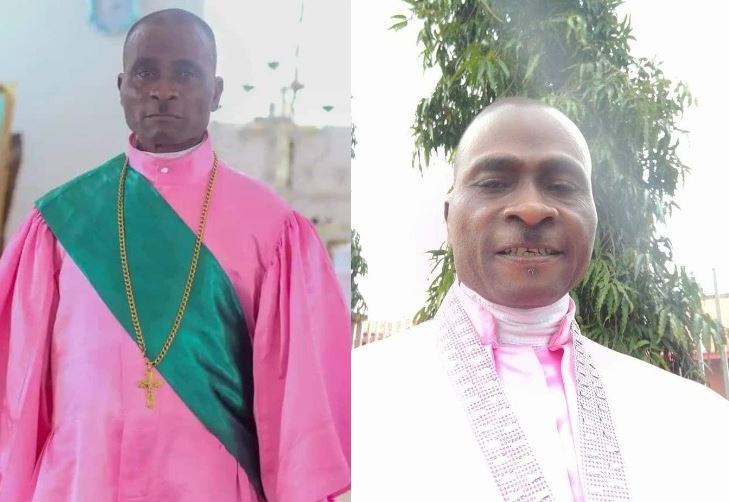
The Federal High Court in Lagos, through Justice Ambrose Lewis-Allagoa, has restrained telecommunication operators in Nigeria from deactivating or barring any line or SIM that has not been linked to the NIN by their subscribers.
Justice Lewis-Allagoa ruled on a suit filed by lawyer Olukoya Ogungbeje, who sought to stop the move to disconnect subscribers over NIN–SIM linkage, stating that it infringed on his fundamental rights.
Ogungbeje, in a suit numbered FHC/L/CS/667/23, named the Federal Government of Nigeria, the Attorney General of the Federation and Minister of Justice, MTN Nigeria Communications Plc, and Airtel Networks Nigeria Limited as respondents.
“That the respondents are aware of the appellant/applicant’s appeal to the Court of Appeal of Nigeria, as the respondents have since been duly served with the appellant/applicant’s Notice of Appeal.
“That despite the pendency of the appellant/applicant’s appeal, efforts are underway by the respondents, specifically on the 28th of February 2024, to ensure further and outright barring, deactivating, and restricting of SIM cards and phone lines of the applicant and that of Nigerian citizens.
“That the appellant/applicant’s appeal to the Court of Appeal of Nigeria has a high degree of success against the respondents.
“There is a need to preserve the rest of the subject matter of the appeal pending the hearing and determination of the appellant/applicant’s appeal at the Court of Appeal of Nigeria.
“That the appellant/applicant is desirously interested in diligently pursuing the instant appeal that has raised a novel and recondite issue substantially jurisprudential, constituting an exceptional circumstance in which this Honourable Court can grant an application of this nature.
“That the court has the power and jurisdiction to grant an application of this nature in the interest of justice,” he stated.
The naira gained against the dollar as the Central Bank of Nigeria (CBN) took more measures including delivering a massive hike in its benchmark interest rate on Tuesday in a bid to rein in rising inflation so as to stabilise the economy.
Following the conclusion of the two-day Monetary Policy Committee (MPC) meeting held in Abuja on Tuesday, the CBN hiked the monetary policy rate (MPR) to 22.75 percent from 18.75 percent.
The central bank also raised the cash reserve ratio (CRR) to 45 percent from 32.5 percent. The asymmetric corridor was widened to +100-700 basis points around the MPR from +100/-300 basis points set in July 2023. However, the liquidity ratio remained unchanged at 30 percent.
The naira strengthened to 1,420 per dollar at the Bureau De Change segment of the foreign exchange market from over 1,800/$. In the parallel market, commonly known as the black market, the dollar closed at N1,550 as against N1,900 on Friday.
However, at the Nigerian Autonomous Foreign Exchange Market, naira depreciated to 1,615.94/$ on Tuesday from 1,582.94/$ on Monday, data from the FMDQ indicated.
Bismarck Rewane, managing director/CEO of Financial Derivatives Company Limited, said the CBN was aggressive in its tightening and that this shows that the country is now in a high interest rate environment.
He said this development will strengthen the currency, deflate the stock market in the next few days, and bring some level of sanity in the markets. He expects to see massive appreciation of the naira in the FX market.
A former top official at the CBN said quick execution and steady nerves should bring inflows to stabilise currency and moderate inflation.
He said: “Now deputy governor in charge of financial system stability needs to keep a close eye on bank balance sheets. Higher lending rates may lead to higher loan defaults at a time of reduced real disposable incomes. Higher market rates may lead to losses due to market risk in the event of sell offs to shore up liquidity by marginal banks.
“But priority is to stabilise the macro and this decision is excellent. We just need to keep an eye on risks to bank balance sheets as we move from excessively loose monetary conditions to a more responsible stance.”
According to Abiola Rasaq, former economist and head investor relations at United Bank for Africa Plc, these transitory monetary policy measures reflect the inflation-targeting orientation of the new leadership at the CBN and overall monetary policy committee.
He said this would increase the cost of funds of banks and shrink net interest margin, albeit the MPC’s overarching interest is to stem the pressure on exchange rate and consumer prices.
He said the MPC sought to gradually narrow the negative real interest rate to attract foreign portfolio investors while also incentivising domestic investors as a way of stimulating appetite for naira-denominated assets.
Rasaq said: “It’s a double-edged sword that will hurt money supply and consequently undermine employment creation, but the MPC may have limited options at this time, hence I consider this measure as transitory douses to stem the current crisis.
“Banks profitability will be challenged, and indeed, the policy measure increases the probability of loan default in the banking sector, nonetheless, it’s a short term measure that hopefully will help to cool-off pressures and allow the monetary and fiscal policy authorities some time to reset the system and implement sustainable long term measures relevant for economic growth and development.”
Razia Khan, managing director and chief economist for Africa and the Middle East Global Research at Standard Chartered Bank, emphasised the critical need to stabilise Nigeria’s FX market as an immediate priority.
She highlighted the importance of fostering a better-functioning official FX market before considering the adoption of a formal inflation target.
Analysing the policy response, Khan questioned the adequacy of the tightening measures implemented.
She said the increase in the CRR to 45 percent, acknowledging it as a meaningful tightening move, particularly with the central bank shifting away from ad-hoc CRR debits.
However, Khan raised concerns about the lack of transparency surrounding the previous CRR regime and its effectiveness, making it challenging to assess the true impact of the tightening.
“The Monetary Policy Rate itself was raised 400 bps. The signal on the tightening intent that this sends is important, and we expect that markets will not dismiss it,” she said in an email to BusinessDay.
Reacting to the MPC’s decision, Kingsley Moghalu, former deputy governor of the CBN, said on X: “Correct move by the Monetary Policy Committee to dramatically hike the Monetary Policy Rate by 400 basis point to 22.5 percent. The situation calls for nothing less if we are to check inflation over 12-18 months. We did the same a decade ago to bring inflation from 14 percent to 8 percent.”
Muda Yusuf, CEO of the Centre for the Promotion of Private Enterprise, said the outcome of the MPC meeting would hurt the real sector of the economy that is already contending with numerous macroeconomic challenges.
He said the increase of MPR and CRR posed a major risk to the financial intermediation role of banks in the economy.
“The increase would constrain the capacity of banks to support economic growth and investment, especially in the real sector of the economy because the increases are quite significant,” he said.

At least 20 students of some boarding public schools in Potiskum, Fika, and Fune local government areas of Yobe State have died from a suspected Meningitis outbreak.
It was learnt that the deaths were recorded in Government Science Technical College, Government Girls Science Technical College, and Federal Government Girls College, all in Potiskum LG.
A source in the town told our correspondent that at least 20 students died, adding that most of the affected students had been admitted to the Specialist Hospital in Potiskum and were responding to treatment.
When contacted, the Commissioner for Basic and Secondary Education, Dr. Muhammad Sani Idris, confirmed the outbreak, saying 20 students were killed by the disease suspected to be meningitis.
He said Governor Mai Mala Buni had directed the state Ministry of Education to temporarily relocate to Potiskum in response to the outbreak.
The commissioner also confirmed that several students had been admitted to Potiskum Specialist Hospital.
Lagos University Teaching Hospital, LUTH, yesterday, rejected an allegation of negligence in the death of Mr. Olaleye Adenibuyan, who died at the facility while receiving care from a critical fall.
While commiserating with the family of the deceased, LUTH management explained that the late Adenibuyan, who was admitted unconscious into the facility on January 15, 2024, was attended to at the Emergency Department and stabilised by a team of neurologists and neurosurgeons.
In a statement, the Chairman, of the Medical Advisory Committee, Dr Ayodeji Oluwole said: “In the ICU, his care was coordinated by a team of neurosurgeons, intensivists, and ICU nurses. Throughout his stay in the hospital, the managing team was in direct and constant contact with Mr Adenibuyan’s immediate family, including his wife and son.
“Our records reveal that he was given prompt, appropriate, and professional care for his condition by senior medical professionals.
“In situations when hospital equipment experiences downtime, the hospital policy is for an ambulance and appropriate healthcare professionals to be made available to take the patient to a sister facility for the required procedure to be carried out.
“This was communicated to Mr Adenibuyan’s family when he needed a repeat CT scan. For the records, LUTH has functional imaging facilities including MRI, X-ray, ultrasonography, fluoroscopy, and mammography machines.
“Deployment of equipment such as the intracranial pressure, ICP, and monitors requires consumables such as probes. Such consumables are supplied by private vendors, and the costs are borne by the patient for which they are used. It is these consumables that were required to be made available in this case. The decision on the timing of deployment of the ICP monitor was taken by the Neurosurgeons, with due consideration given to the potential benefits of ICP monitoring versus the potential risks that may arise from placing a foreign body within the brain.”
[Vanguard]
The Nigeria Labour Congress (NLC) has suspended its two-day nationwide protest.
The NLC had declared a two-day nationwide mass protest for February 27 and 28, over the economic hardship confronting millions of Nigerians since the removal of the petrol subsidy in May 2023.
The NLC and Trade Union Congress of Nigeria (TUC), had on February 8, given a 14-day ultimatum to the federal government over the rising cost of living in the country.
A late night meeting on Monday between the federal government and NLC was not enough to convince the latter to shelve the nationwide protests.
On Tuesday morning, the protesters began their marches from the Labour House in Abuja and the Ikeja under-bridge in Lagos, while chanting solidarity songs and slogans.
Joe Ajaero, NLC president, and Omoyele Sowore, presidential candidate of the African Action Congress (AAC) in the 2023 election, led the Abuja rally.
But in a communique at the end of its national executive council meeting on Tuesday, the NLC said the objectives of the protest were achieved on the first day of the demonstration.
“Consequently, NEC-in-session resolved as follows: to suspend street action for the second day of the Protest having achieved overwhelming success thus attained the key objectives of the 2-day protest on the first day,” the communique reads.
“However, Nationwide action continues tomorrow with simultaneous Press Conferences across all the states of the federation by the state Councils of the Congress including the National Headquarters.”
The NLC NEC also resolved in its meeting, to “reaffirm and extend the 7-days ultimatum by another 7 days which now expires on the 13th day of March, 2024 within which the Government is expected to implement all the earlier agreement of the 2nd day of October, 2023 and other demands presented in our letter during today’s nationwide protest”.
“To meet and decide on further lines of action if on the expiration of the 14 days Government refuses to comply with the demands as contained in the ultimatum,” the communique reads.
[TheCable]

Eze Chukwuemeka Eze, a chieftain of the All Progressives Congress has called out President Bola Tinubu.
According to Punch, he rejected what he described as the excuses and blame game dished out by the presidency as the cause of the deepening economic woes.
Eze says President Bola Ahmed Tinubu and his team seem entrapped in a quagmire as hope is nowhere in sight to get the country out of the pickle.
The APC chieftain claims that the Nigerian economy has progressively continued in a free fall while the value of the Naira to other convertible currencies is steadily on a downward trend and is nearing a state of worthlessness in the international money market.
He noted that the effect of the uninterrupted journey of the Naira to its place of final rest is the hike in the price of food and other basic commodities.
Eze noted that the attendant reality is the hunger and starvation that is feasible on the faces of angry Nigerians, who, according to him, are unsure of a square meal for each passing day and most of whom go to bed each night hungry.
Despite the overwhelming challenges of the time which has sealed Nigeria’s place as the poverty capital of the world, Eze wondered why some analysts still hold the view that Tinubu is right in his policies.
Countering the assertions of pro-Tinubu commentators, Chief Eze said: “Assuming the policies were good, with very little or no thought towards the complex chains of reciprocal interactions and variables required in the translation of policies into actions, there is bound to be a widening gap between intentions and results as is the case in the present.”
In a statement made available to the media, the politician expressed shock over a recent comment credited to Vice President Kashim Shittima, who had inferred that politicians who lost in the 2023 general election were orchestrating a plot to destabilize Nigeria.
Describing Shetima’s claims as inconsequential, Eze said Tinubu was never prepared to make any meaningful impact in Nigeria, adding that his only concern was to be President and nothing more.
“The pernicious effects of perpetual poverty have become real under his administration and these are his chief legacies,” he said
“There seems to be no efforts by the present administration in tackling the economic concerns of the country and if there are, he said, it means such efforts are not good enough and shifting blame to patriots who are in their private capacities thinking out ways to help the country is to say the least myopic.
“I laugh at the reasons expounded by some of our leaders and Scholars as the factors behind our present food Crisis. They failed to highlight insecurity as the main bane of the present economic woes facing Nigeria.
“Where do we get the food to eat when most of the farmers both in the North and Southern sections of this country particularly those in the North Central are now in the IDP Camps leaving their farms in the hands of herders?
“And we are busy fooling ourselves that we don’t have enough food to feed the populace. What part of Nigeria is safe or secure for normal farming activities to take place?
“This is the reality. Our problem is human-induced yet we are expecting God to send us manna from Heaven as he did to the people of Israel who had no means of farming at the period God sent manna to them."
Eze highlighted that apart from insecurity another major cause of Nigeria’s present woes was the inability of the President who in 2012 highlighted the consequences of the removal of subsidy but was carried away by his election victory and announced without a proper study and provision to ameliorate the suffering of Nigerians, the removal of oil subsidy.
Most Superior Evangelist Olagbaju Moris Gbade Fadehan, the Shepherd In-Charge of CCC Grace of Comfort Parish, Obaloran Quarters, in Ile-Ife Osun state, was reportedly killed in the church premises on Monday evening, February 26, by his serving assistant, Evangelist Olalekan Ogundipe.
According to reports, Fadehan had a conflict with the suspect and this degenerated into a fight after the close of their service on Monday evening.
The suspect allegedly stabbed Fadehan, causing him to die on the spot. The suspect thereafter allegedly set the deceased ablaze with his sutana on him.
The suspect was immediately apprehended and handed over to the police.
The spokesperson of the command said investigation into the incident has commenced.

A former Secretary to the Government of the Federation (SGF), Babachir Lawal, has condemned the policies taken by President Bola Tinubu.
In an interview with TheCable, Lawal said President Tinubu was insensitive and arrogant in his decisions when he took over power.
According to the former SGF, Tinubu announced the removal of the fuel subsidy without due consultation.
Speaking on the situation in the country, he said, “I have a different view of what is happening today, and I did say on quite a few occasions that Bola Ahmed Tinubu exhibited an unimaginable degree of insensitivity and arrogance, first in the face of the Muslim-Muslim ticket and in some of the earlier decisions he took.
“My view is that fuel subsidy removal was driven by a sense of arrogance. You are now sworn in, and you believe that since you are now in charge, you can boss everybody around. You just announced the removal of the fuel subsidy without due consultation.
“My experience in life is that when you are going to take a monumental decision, especially one that affects the lives of over 200 million people, you need to have wide consultations.
“Taking such a spur-of-the-moment decision on that very important issue is very insensitive, and probably he (Tinubu) was ignorant of the challenges he was going to face.
“That was why everything came crashing down immediately after he was sworn in because of the removal of the fuel subsidy. He ought to have waited, formed a cabinet, got every relevant person in place, and held discussions among his advisers and the cabinet. By so doing, they will get alternative solutions to the removal of subsidy, whether or not it should be done.
“If they agree that subsidy must go, what are the actions that will be put in place to mitigate the negative outcomes? If the outcomes are positive, they will also consider how to maximise them. They will also list their options. If this happens, then we fall back on this.
“He has enough examples from the past to rely on. When (Sani) Abacha removed subsidy, he created the Petroleum Trust Fund (PTF) to channel the additional income into social development, and everybody today knows the various projects undertaken by the PTF, such as hospitals, schools, social services, and so on.
“When (Olusegun) Obasanjo removed the subsidy, he created SURE-P to renovate roads and carry out social services. I don’t understand how my friend Tinubu got this arrogance that he could do things radically different from others who were before him and get results.
overlay-clevercloseLogo
“So, he is only reaping the benefits of his hasty decision, and we are also reaping the benefits of putting in power somebody who works in a cavalier manner.”
The Ogun State Skills Fund, an agency under the Ministry of Education, Science and Technology, has enjoined interested and eligible public and private Training Service Providers (TSPs) to submit their proposals for participation in its 2024 skill acquisition programme.
A release signed by Commissioner in the Ministry, Prof. Abayomi Arigbabu, indicated that areas of participation include, Information and Communication Technology (ICT) skills, training for remote, local jobs and ICT start-ups.
Others were, Skill Development for Employment and Self-employment, Entrepreneurship training, including digital and finance literacy, as well as Foundational Skill Training in Basic Infrastructural Digital Literacy.
The release further stated that interested applicants should visit: www.osf.ogunstate.gov.
Applicants were advised to visit the Office of the Ogun State Skills Fund (OSF), Rooms 213 to 216, Ogun State TechHub, Kobape Road, Abeokuta, or e-mail, This email address is being protected from spambots. You need JavaScript enabled to view it..

The Central Bank of Nigeria (CBN) governor Yemi Cardoso says over $26 billion has passed through the crypto app Binance Nigeria in the last one year.
Cardoso said this on Tuesday after the MPC meeting in Abuja.
“In the case of Binance, in the last one year, 26 billion dollars has passed through Binance Nigeria from sources and users who we cannot adequately identify,” he told reporters in his first MPC meeting since assuming office as the CBN governor.
The CBN also raised the country’s Monetary Policy Rate(MPR) by four hundred basis points to 22.75 percent from 18.75 percent.
The MPR has been 18.75 percent since the last MPC meeting between 24th and 25th July 2023.
With inflation at 29.90 percent, he said the new MPR is part of moves to tackle the country’s inflation.
Cardoso who chairs the MPC also said the Cash Reserve Ratio(CRR) has been raised to forty-five percent while the liquidity ratio was left unchanged at thirty percent.
CBN Governor Yemi Cardoso briefs the press after the MPC meeting in Abuja on Tuesday, February 27, 2024.
Nigeria has been battling economic woes in recent months, but Cardoso said his team is not responsible for that.
“I laugh at that question but it’s not a laughing matter and I think it is very important for Nigerians to understand that the Central Bank Governor — I and my team — are not responsible for the woes that we have today; we are part of the solution,” the former Lagos State Commissioner for Economic Planning and Budget said.
“We are determined to ensure that we work hard to get out of the mess that Nigeria is in. We assumed responsibility in a time of crisis of confidence; there was a crisis of confidence and you may all want to go to bed and wish that crisis of confidence was not there but it was, and we can’t turn back the clock.
“All we can do is do the difficult things to make a bad situation better and I do believe that the efforts that we are making are beginning to bring back confidence because to be frank, without confidence in your business, you are not going to get far.”
More...
The Nigeria Labour Congress (NLC) has said that the ongoing protest aims to compel the Federal Government to halt obnoxious policies that have led to the economic crisis in the country.
The Congress lamented that the government’s draconian policies are killing workers and Nigerians in general.
The Kogi State Chairman of the NLC, Gabriel Amari said this on Tuesday at the national protest rally against economic hardship, hunger, poverty and insecurity in the country held in Lokoja.
Amari particularly mentioned that the protest is not a coup or threat to the Kogi State Government but a way of telling the world that Nigerians are dying.
He lamented that Nigerians have now turned to beggars because they can no longer take care of the basic needs of their families.
“We are here to tell the whole world that Nigerians are dying because of the draconian policies of the Federal Government. The adoption of IMF and World Bank policies that led to the devaluation of Nigeria’s currency has put the entire Nigeria in crisis.
“You can see that there is no food. There is hunger everywhere. People can no longer attend to their health needs or sponsor their Children to School. Nigerians have now turned to beggars because they can’t provide for their immediate family. People are losing their jobs on a daily basis.
“We can’t fold our hands in the same country we call ours for a selected few people to come up with policies that are dangerous and detrimental to the lives of Nigerians.
“That is why the leadership has come up with this protest to tell the whole world that we are hungry and the Federal Government should reverse their policies. The policies are against us” he stated.
The NLC Chairman, however, commended Kogi workers for coming out in large numbers to protest, insisting that the protest will continue tomorrow Wednesday in line with the national directive of the union.
Adding his voice, the immediate past Chairman of the NLC in Kogi State, Onuh Edoka while aligning himself with the positions of his successor, called on the Federal Government to fix the nation’s refinery, invest more in agriculture and fight corruption to the barest minimum.
According to him, “The Federal Government should know that people are dying because of the hardship in our country. We can’t pretend as if all is well with us. All is not well. Some policies of the government are anti-people, which must stop now. It is high time the Government holds the bull by the horns to fix our refineries, invest massively in agriculture and ensure that they kill corruption from our system”.
[NaijaNews]
Barrister Chris Agidy, the Senior Legislative Aide, SLA, to the lawmaker representing Delta North, Senator Ned Nwoko, who was kidnapped by bandits in 2023, has been killed.
The Federal Capital Territory, FCT, Police Public Relations Officer, SP Josephine Adeh, confirmed this to DAILY POST on Tuesday.
Recall that at least 19 persons were in November 2023 kidnapped from their homes in the Galadimawa area of nation’s capital by gunmen.
However, the identities of the deceased was not clear as the lawmaker and the security operatives continued efforts to rescue the lawyer.
Confirming the killing on Tuesday, the FCT PPRO said the lawmaker’s aide was killed by one of the wanted notorious kidnappers terrorizing the country’s capital city, Samaila Wakili.
Wakili was arrested on February 24 at the Sardauna Forest, in the Toto area of Nasarawa State, by police operatives.
The FCT PPRO said the suspect, upon his arrest, “led police operatives to where the remains of Barr. Chris Agidy is”.
She noted that “the remains was recovered and deposited in Gwagwalada General Hospital”.
[DailyPost]
The Deputy Speaker of the House of Representatives, Benjamin Kalu, has said that the salary of the National Assembly members is not as much as Nigerians think and 50 per cent of it cannot be sacrificed to mitigate the suffering of the masses.
Amidst the ongoing economic crisis, some Nigerians have urged members of the National Assembly to take a significant step in alleviating the suffering.
One of the calls demanded the lawmakers to cut their salaries by half to demonstrate solidarity with the masses grappling with rising inflation, unemployment, and a general decline in living standards.
Responding to the call during an interview on Channels Television, the Deputy Speaker acknowledged the severity of the crisis and emphasized the need for intervention.
He also underscored the importance of sound policies that extend beyond mere pronouncements.
Kalu said that delayed gratification is essential for long-term gains, even as Nigerians endure the current hardships.
He assured the public that the 10th National Assembly was not indifferent to their plight, adding that they were prepared to make adjustments where necessary.
He explained that while salaries are fixed and form part of legislators’ compensation, allowances serve specific purposes related to their duties.
He added that spending allowances is strictly regulated, and any misuse can result in sanctions upon retirement.
He also said that contrary to popular belief, the salary of the National Assembly members fell short of public perception, noting that reducing it by 50 per cent would not significantly impact the public.
He said, “If we found out (just like we did during the COVID 19) that people are suffering and we need to intervene, we will make certain sacrifices to be able to identify with the people.
“I can assure you as well that we are not hoping that this crisis we are going through will linger for a very long time because when you have sound policies, it doesn’t end with just policy pronouncement; we need to give a timeline for the maturation of that policy and Nigerians are passing through a phase now in which delayed gratification for a better gain tomorrow is necessary.
“We don’t intend to make it last for too long. But if there’s the need to make some adjustments, I can assure you that the members of the 10th National Assembly are willing to make adjustments.
“But at the moment, talking about the salary of the members of the National Assembly, it’s not as much as people think. Salary is different from allowances, which are meant to do the jobs that the constituencies have sent us to do.
“Nobody is allowed to touch allowances, it’s your salary that belongs to you. Allowances have subheadings for things which they are meant for. If you use it wrongly, when you are retiring, you would be sanctioned for that.
“So talking about the salary of the members of the National Assembly, it’s far from what it’s supposed to be. And I can assure you that if you reduce it by 50%, it would not really impact the public.
“Based on current economic indices and the inflationary rate at the moment, what the members of the National Assembly are receiving cannot actively take them home to do their jobs in their various constituencies. So how could they cut their salaries by half?”
[DailyTrust]
The Joint Admissions and Matriculation Board (JAMB) has said the sale of Direct Entry (DE) registration nationwide and in selected foreign centres would commence on Wednesday.
The public communications advisor at JAMB, Fabian Benjamin, in a statement on Tuesday, February 27, said the registration process would start on Wednesday, February 28, and close on Thursday, March 28.
Benjamin noted that the sale of DE was open to foreign candidates desirous of tertiary education in Nigeria through the Direct Entry mode.
The JAMB spokesperson assured the public that the board will continue to ensure a level playing field for all candidates irrespective of status.
He, however, warned that the board would not process candidates’ applications from all awarding institutions that have refused to honour several requests for the verification of their A’level certificates presented by some candidates for the 2023 admission.
The statement said: “Candidates who are not awaiting results, must have uploaded their A’ level qualifications, O’level results and DE registration template at the point of registration as no DE candidates would be processed for admission until such claimed results are uploaded and verified by the awarding institutions on the Board’s Central Admissions Processing System (CAPS) mail platform.
“DE candidates, who at the point of registration are awaiting A’level results of IJMB/JUPEB/NABTEB, must have uploaded their Admission Letter and Registration Template at the point of registration. Applicants with Cambridge certificates for the pre-2018 examination year should visit Cambridge directly for verification.
“This verification exercise may take up to 28 days (as specified by the awarding body) after which the verification result would be forwarded to the Board. The verification would be reflected on the e-Facility profile of the DE candidate. Statement of results (in lieu of certificate) is accepted for registration only within three years of the date of award.
“The Board has also given a window of opportunity for upgrading from UTME to DE with a proviso for only candidates whose DE results have not been released at the point of UTME registration and who must have indicated at the point of registration that he/she is awaiting A’level results. The particulars of which he/she must have supplied and contained in the uploaded registration template.”
[TheNation]


